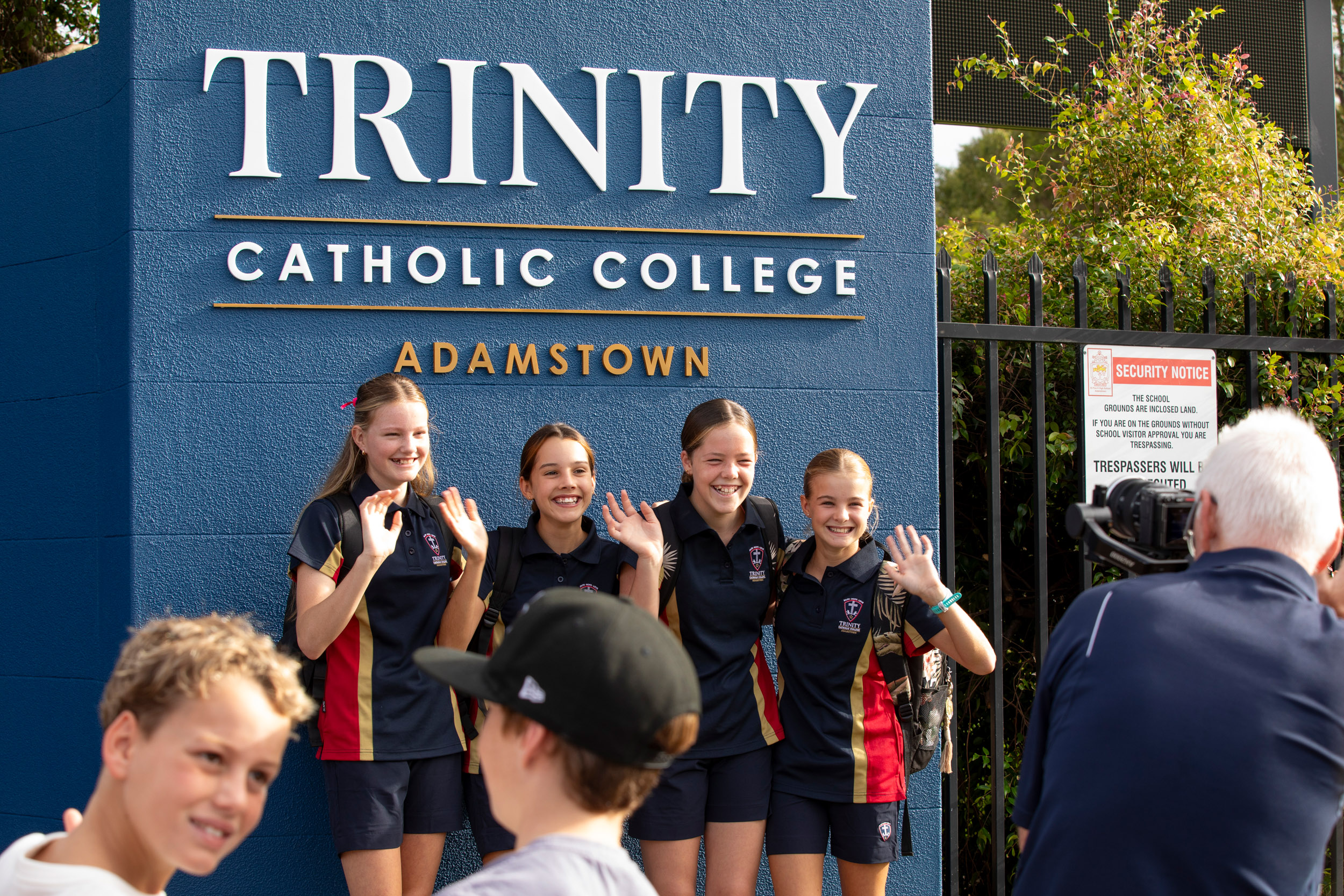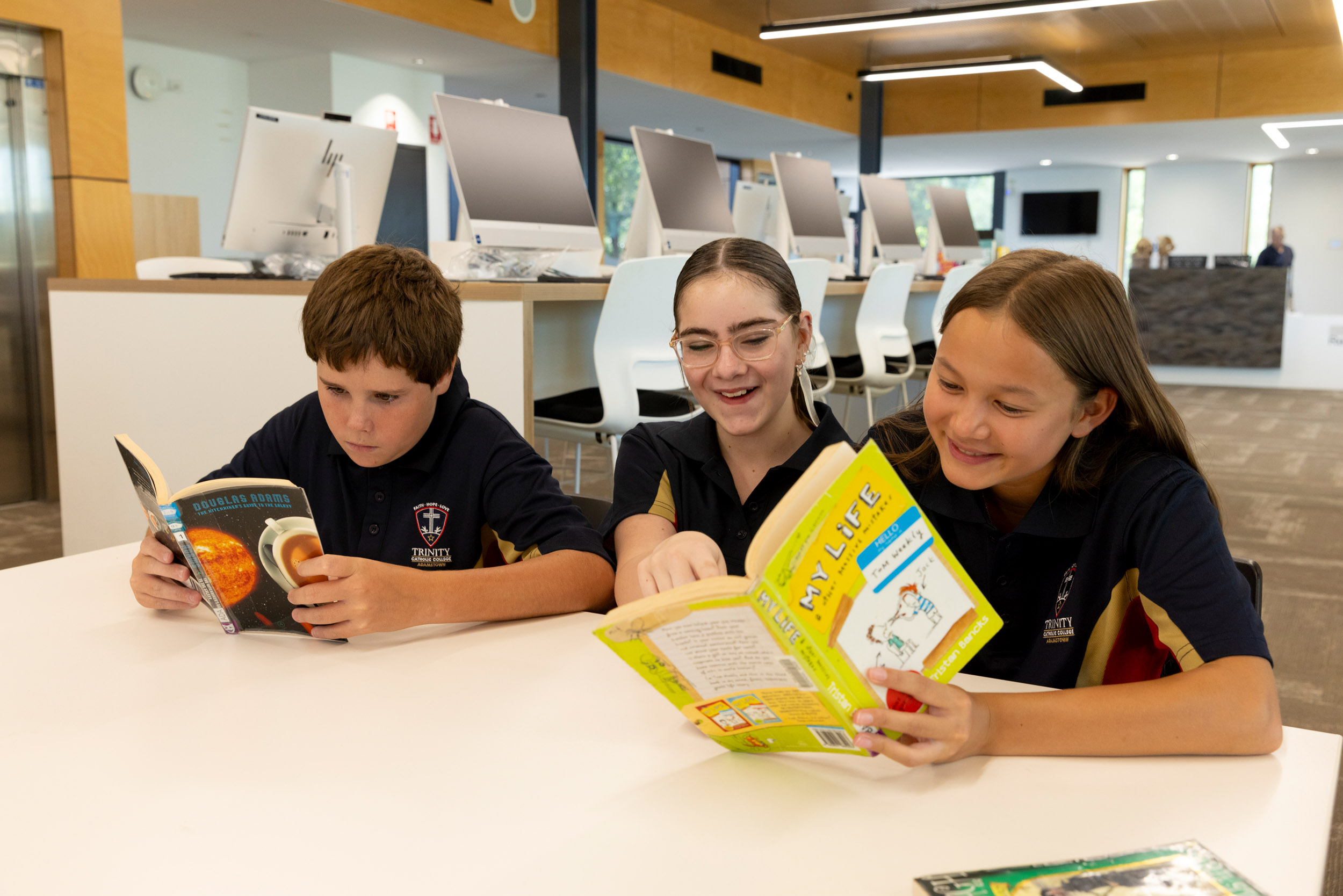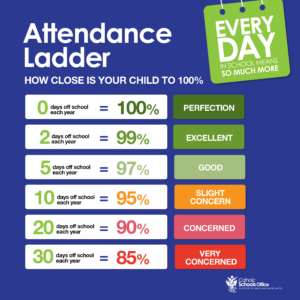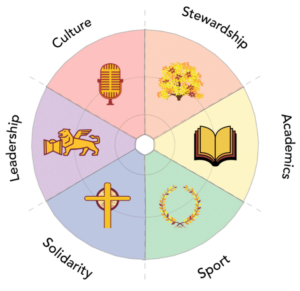
Trinity Catholic College
PERMAH Model
The PERMAH model focuses on six elements that contribute to our overall wellbeing and aligns with the CS Wellbeing Framework.
Access HerePositive Behaviours for Learning
Trinity Catholic College is transitioning to a Positive Behaviours for Learning (PBL) framework, aligning with the CS Behaviour Management Policy. This change is an important step in our commitment to creating a positive, safe, and supportive learning environment for all our students.

What is Positive Behaviours for Learning (PBL)?
PBL is an evidence-based framework that unites the entire school community—students, staff, families and the wider community—in fostering a culture of positive behaviour. The PBL approach is not just a program; it is an ongoing process that promotes positive behaviours while addressing challenges to enhance the learning experience for all students.
In line with this approach, we are strengthening and refining our systems, structures, processes and decision-making to improve practices across the school. For example, we will use school-wide data to identify behavioural patterns, monitor student progress, evaluate the effectiveness of teaching practices, and make data-informed decisions that support a positive learning environment.
Key Expectations and Guidelines
We have clear expectations for behaviour, grounded in respect and the Gospel values of responsibility and care for others. These guidelines are designed to ensure the safety, wellbeing and dignity of everyone in our school community.
As a Catholic school, we strive to build strong, supportive relationships based on Gospel values. This shared responsibility fosters an inclusive environment where all members of the community feel valued and respected.
The “Hands Off” Rule
To ensure a safe and respectful environment, students are not permitted to put their hands on another student, their belongings, or school property in a way that causes harm. If personal or school property is damaged or stolen, students responsible may be required to rectify the situation.
Anti-Bullying Commitment
We are committed to creating a safe, inclusive, and respectful learning environment where all students feel valued and supported. We reject all forms of bullying – both in person and online – and actively promote student wellbeing.
Our staff use evidence-based strategies to create a positive school climate, reducing the likelihood of bullying behaviours.
When addressing incidents of bullying, we follow a structured and consistent approach guided by:
- the seriousness and nature of the incident,
- the frequency of previous occurrences, and
- the guidelines outlined in the CSO policy and procedures.
Prohibited Items
To maintain a safe and clean environment, students must not bring the following items to school:
- Aerosol deodorants (a potential risk for asthma sufferers)
- Permanent markers
- Chewing gum/Bubble gum
- Liquid paper
If these items are found, they will be confiscated, and the student will be assigned an appropriate community service consequence.
Serious Offences
The possession, use, or sale of the following items is a serious breach of school expectations and will result in an immediate referral to the Principal for suspension or expulsion consideration, along with potential police notification:
- Alcohol
- Cigarettes and vapes
- Illegal drugs
- Dangerous or illegal items, such as knives, weapons, firecrackers, explosives, and spray cans
This list is not exhaustive, and includes any substance or item deemed to be dangerous or illegal.
Serious Breaches of School Expectations
The Principal reserves the right to exercise discretionary powers in all aspects of discipline matters in consultation with Catholic Schools. Trinity Catholic College does not support corporal punishment as a form of discipline.
In cases of serious misconduct, such as causing harm to others or significant breaches of College rules, consequences may include suspension or expulsion. Decisions are made following procedural fairness and the CS Suspension/Expulsion Policy.
Factors considered in these decisions include:
- The safety of students and staff.
- The specific circumstances of the incident.
- The student’s age, individual needs, any disability and developmental level of students.
Subject to factors outlined in the CS Suspension Policy, Principals, Assistant Principals, will impose a long suspension for:
- physical violence causing injury, or which seriously interferes with the safety or wellbeing of other students and staff (including sexual or indecent assault).
- possession or use of a prohibited weapons including firearms, ammunition, replica firearms, knives, laser pointers, or similar articles. Prohibited weapons do not include harmless children’s toys such as plastic imitation guns that are clearly intended to be toys.
- possession, supply or use of a suspected illegal substance. This does not include alcohol or tobacco but does include supplying other students with illegal drugs or restricted substances such as prescription drugs.
- criminal behaviour related to the school. This includes malicious damage to property (school or community), or against the property of a fellow student or staff member on, or outside of the school premises.
- persistent or serious misbehaviour. This includes but is not limited to:
- repeated refusal to follow the school rules or discipline code.
- threatening to use a weapon in a way that might seriously interfere with the safety and wellbeing of another person
- making credible threats against students or staff that involve risks.
- behaviour that deliberately and persistently interferes with the rights of other students to learn or teachers to teach including bullying, harassment and victimisation.
Legal and Child Protection Guidelines
Serious offences, including bullying, may be subject to legal requirements and other sanctions. The College strictly adheres to Child Protection Guidelines and relevant policies, including:
- Guidelines & Procedures for Child Protection (Updated 2016)
- CS Wellbeing and Pastoral Care Policy (2017)
- CS Anti-bullying Policy for Students (2019)
We encourage all families to partner with us in ensuring a positive and supportive environment where students can thrive academically, socially, and spiritually.

Trinity Catholic College
PB4L Expectations Matrix
The RAISE School Expectations model was developed by the Trinity Catholic College school community for the Positive Behaviour 4 Learning (PB4L) framework.
It focuses on five elements that contribute to our overall wellbeing and aligns with the CS Wellbeing Framework.
View HereMore Information
Attendance
Regular school attendance is crucial to the academic success and overall wellbeing of students. Every day a student attends school contributes to their learning, social development, and personal growth. Conversely, each absence can negatively impact their academic progress, social connections, and emotional health.
The school and Diocese of Maitland-Newcastle, in partnership with parents and carers, is committed to promoting and ensuring consistent student attendance. In New South Wales (NSW), all children between the ages of six years and the minimum school leaving age, as defined in the Education Act 1990 (NSW), are legally required to attend school unless they are registered for home schooling with NESA.
Parents or carers must provide an explanation on Compass for any school absence within seven (7) days. Parents can also contact Student Services either by phoning the school or email studentservices@adamstownsp.catholic.edu.au
Late Arrivals and Early Departures
To minimise disruptions, parents/carers are encouraged to schedule appointments outside school hours.
- Late Arrivals: Students arriving late must be signed in at the Student Services kiosk by a parent/carer, with an explanation provided.
- Early Departures: If a student needs to leave early, parents/carers must visit Student Services to sign them out. Students are not permitted to leave the school grounds early without a parent/carer.
If someone other than a listed emergency contact is collecting the student, the school must be informed via email to update the arrangements.
Senior Students
Senior students may sign in or out for appointments if the school receives prior written notification from a parent/carer via email.
Requests for Extended Leave (Elite Sport/Travel)
For absences exceeding 10 days, parents/carers must complete an Extended Leave Application available on Compass under School Documentation > Extended Leave. Submit the application at least two weeks before the leave to allow time for processing the required certificate.
Attendance Concerns
The school will contact parents/carers if attendance patterns or concerns are identified. If your child is refusing to attend school, it is crucial to inform their Care Group Teacher promptly to address any underlying issues.

House System
Our pastoral care is grounded in a House system framework, fostering a strong sense of community, belonging, and mutual support among students. The House system’s primary strength lies in its ability to bring together students across various age groups, promoting an inclusive and collaborative environment where teamwork is encouraged.
The College is divided into six Houses—AVILA, FRANCESCO, KOLBE, SIENA, MACKILLOP, LOYOLA – enabling students to form close connections within these smaller communities. This structure cultivates a spirit of healthy competition and strengthens relationships between students and staff, further enhancing each student’s connection to the school community.
Our House system also supports students in leading lives of faith, hope, and love, aligning with our core values and mission. Through this structure, students can experience a fulfilling school life enriched by strong relationships and a sense of belonging.
Positive Recognition
We are dedicated to nurturing the values of faith, hope, and love within our community. Our Lumen Awards is a points-based Compass initiative designed to foster a growth mindset. Through the Lumen Awards, students are inspired to grow, thrive and engage in personal growth in areas of strength and to challenge themselves outside their comfort zones.
“Let your light shine before others, so that they may see your good works.” — Matthew 5:16
The Lumen Awards, draw from the Latin word Lumen, which, in the Catholic context, signifies the “light of Christ.” The title reflects the spirit of our awards system, which recognises and celebrates students’ contributions across various domains of the school community through the awarding of Lumen points.
The awards encompass six key areas, reflecting the four school portfolios—Stewardship, Sport, Culture, and Solidarity—as well as Leadership and Academics. Trinity Catholic College encourages students to take an active role in their growth across these areas, with the school offering many opportunities for students to be involved in the community and beyond. Encompassing a diverse range of extra-curricular and enrichment opportunities for students to develop and showcase their skills, interests and God-given talents, Trinity Catholic College offers a place for every student to shine. Opportunities abound for students to participate in a variety of sporting, cultural and academic pursuits.
“I think that the light we share with others will inspire others to shine.” — Eva Burns, Year 10, 2022
Lumen Awards provide a record of student achievements and contributions. The accumulation of points is a reflections of the students’ positive engagement with their learning and community.
